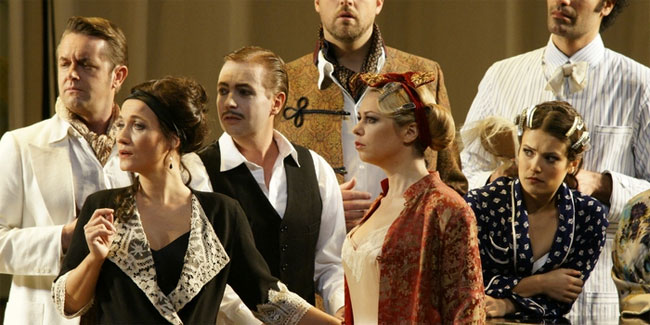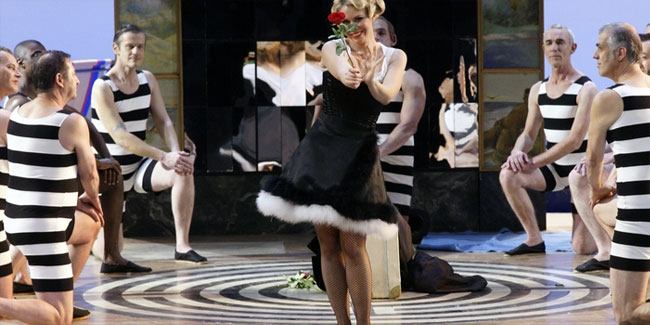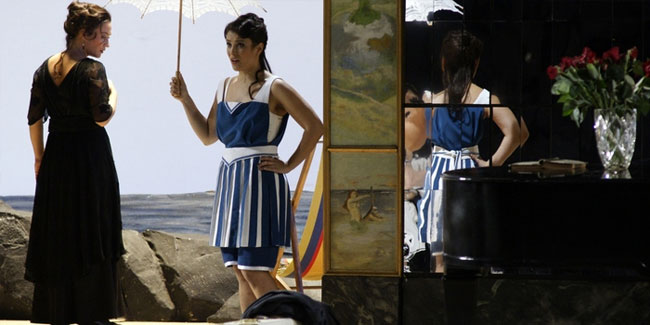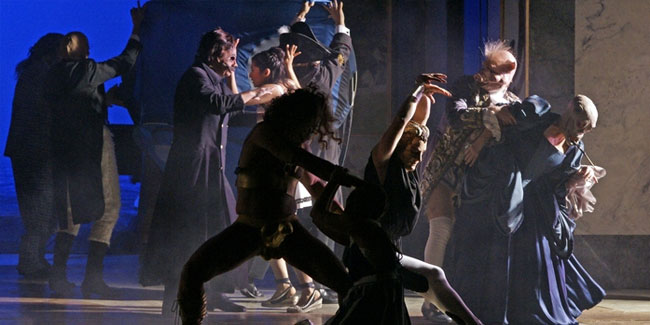Interview with Eric Uwe Laufenberg, by Franziska Knupper

A conversation with the artistic director of Cologne’s Opera House about the life of an actor, his newest Richard Strauss production and about carrying an epée – en garde!
“This is where all the circles of my life are coming to a close, where they are finally meeting each other.” Eric Uwe Laufenberg glances at his audience, satisfied, relieved. People are sipping their white wine, some of them stretching their backs, others are chatting enthusiastically. Everyone is standing in a circle around Mr. Laufenberg and his microphone. It is a Saturday evening in the foyer of Cologne’s Opera house just after the première of Laufenberg’s newest opera production, “Ariadne auf Naxos” by Richard Strauss. Only one week before, Her Royal Majesty met with the director for coffee and conversation.
HRM: Mr. Laufenberg, what was your first step into the world of theatre?
Laufenberg: I completed my degree at the theatre school Folkwang in Essen but soon felt the urge to leave, soon. After being in Darmstadt for a while and getting tired of it as well, I moved to the theatre of Frankfurt where I stayed for 5 years. That was probably the most exciting period at a German theatre I ever had in my whole life.
HRM: Frankfurt and theatre? Really?
Laufenberg: Yes, at that time there were four different companies who all had a different approach towards theatre. Thus, it was an incredibly varied scene and I got the chance to have my first own production. With excellent reviews by the way. (laughs)

For Mr. Laufenberg, this was the smooth transition from being an actor to being a director. Since then he has been in high demand at all important theatres in Europe: Berlin, Vienna, Barcelona, Zürich or Brussels.
HRM: So why do you prefer directing to acting?
Laufenberg: I think my interest already started in school when I was 14 years old and had my first production at the school theatre, “Pygmalion” by Bernard Shaw. I realized that every time when I was reading a text I said to myself: “What would that look like on stage?”
HRM: And now – again – you changed your profession from being the artistic director of a theatre to the one of an opera. Was this an important decision?
Laufenberg: Fundamental. You really have to decide between theatre and opera. Before taking over this position I dedicated 80 % of my time to theatre. Now the opera has completely taken over.

HRM: Would a return to the theatre be possible?
Laufenberg: Every year that I pass at the opera will make it harder to return.
HRM: But is there nothing like “artistic mobility” in your profession?
Laufenberg: Not really. You will always be looked at as what you are at a particular point in time. So when I worked for the theatre everyone thought: “What the hell does he have to do with the opera?” And right now it is the other way around. So the chance to do a movie or a stage direction naturally diminishes with the time I spend here.
Here is Laufenberg’s hometown: Cologne. Here he passed his childhood, entered an opera hall for the first time and started working as a background extra, carrying an epée during a performance of Aida.
Laufenberg: In this region there was such a hunger for a metropolitan opera house! That’s why I wanted to bring Cologne’s opera scene back to its golden age.
HRM: Is that why you made all those sacrifices? Or was it because of your fascination for opera in general?
Laufenberg: Both, I guess. I grew up with the melodies of opera. I lived and still live with all the different pieces and every production marks a different period in my life. And then this offer from my hometown – I just couldn’t resist.

That is why on Saturday, Laufenberg humbly stands in front of his microphone, describing how his life went in circles and how the beginning and end now meet in a city of western Germany. “Ariadne auf Naxos” has brought it all together again. It is a challenging piece, balancing amusement and seriousness, melancholia and shallowness. Laufenberg managed to create a universe of various emotions.
There is tenderness when the curtains in the back of the stage move for almost three minutes, seemingly wavering by the pure sound of music. There is beauty when the composer, the creator of Ariadne, sings of loyalty towards one true, everlasting love.
HRM: So what makes you choose a particular piece to put on stage?
Laufenberg: Curiosity? There are still so many operas left which I haven’t done so far. For example Verdi, that would be new territory for me. (Contemplates for a moment). So maybe Verdi next time? But really in the next two months I have to make two more general decisions: Will I stay in Cologne? And will I stay at the opera?
Those questions seem to be hanging there in the tranquility of his office and later in the burst of applause after his speech. Then it was the audience’s turn to do some work after two hours of remaining silent in their seats.
And to explain why he chose to follow the path of music, Mr. Laufenberg offers: “Because music is the holy art.”

You must log in to post a comment.